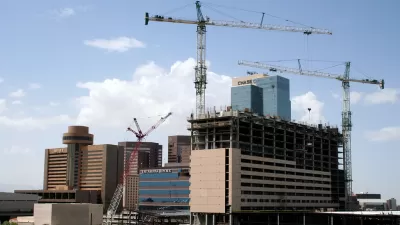Governments should look to land value tax to fund large city-building projects.

"Land value tax dates back to the early roots of modern cities, and it could end up financing our future. In the wake of the financial crisis, governments are reconsidering this progressive tax to fund large, city-building projects," writes Walter Fieuw, Program Manager for the Greater Tygerberg Partnership.
"For those who are unfamiliar, land value tax is a special and progressive tax leveraged against unimproved land value. 'Land' is the unimproved site, not counting infrastructure or buildings; 'Value' refers to the increased market value after public investment; and 'Tax' is the payment due for exclusive occupation of the site.
"The idea to capture value was first popularized by economist and social reformer Henry George (1839–1897) who was convinced that revenue generated from nature and land belonged to society. In his seminal work, Progress and Poverty, George argued that taxing value increases of unimproved land is economically efficient since wealthy developers will foot the bill. George also argued that land value tax deters speculative land holding.
"Even though value capture sounds like a great idea, it challenges the structures and powers of city growth and management. There are some tough choices to be made by the current and next generation of city leaders and managers."
FULL STORY: How to Fund City Growth? Value Capture

Trump Administration Could Effectively End Housing Voucher Program
Federal officials are eyeing major cuts to the Section 8 program that helps millions of low-income households pay rent.

Planetizen Federal Action Tracker
A weekly monitor of how Trump’s orders and actions are impacting planners and planning in America.

Ken Jennings Launches Transit Web Series
The Jeopardy champ wants you to ride public transit.

Rebuilding Smarter: How LA County Is Guiding Fire-Ravaged Communities Toward Resilience
Los Angeles County is leading a coordinated effort to help fire-impacted communities rebuild with resilience by providing recovery resources, promoting fire-wise design, and aligning reconstruction with broader sustainability and climate goals.

When Borders Blur: Regional Collaboration in Action
As regional challenges outgrow city boundaries, “When Borders Blur” explores how cross-jurisdictional collaboration can drive smarter, more resilient urban planning, sharing real-world lessons from thriving partnerships across North America.

Philadelphia Is Expanding its Network of Roundabouts
Roundabouts are widely shown to decrease traffic speed, reduce congestion, and improve efficiency.
Urban Design for Planners 1: Software Tools
This six-course series explores essential urban design concepts using open source software and equips planners with the tools they need to participate fully in the urban design process.
Planning for Universal Design
Learn the tools for implementing Universal Design in planning regulations.
Ada County Highway District
Clanton & Associates, Inc.
Jessamine County Fiscal Court
Institute for Housing and Urban Development Studies (IHS)
City of Grandview
Harvard GSD Executive Education
Toledo-Lucas County Plan Commissions
Salt Lake City
NYU Wagner Graduate School of Public Service


























